Christian Fantasy And Magic
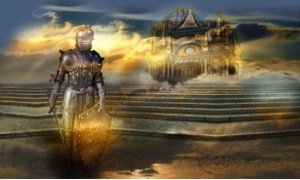 Three Stories Filled With Magic
Three Stories Filled With Magic
The Rescue
The mob pushed closer to the house, beating on the doors and windows. It was only a matter of time before they broke in and killed us—or worse. One of the strangers stood and walked toward the door. He nodded, and the door burst open. He casually raised his hand and a blinding light radiated from it like a shockwave, leveling the men outside. They screamed, clutching at their eyes while blindly stumbling over one another in an effort to flee.
***
The Wizard
Priests danced around the fire, muttering dark enchantments. Nothing happened—no fire, no divine light—nothing.
Finally, the wizard stood up. The corners of his mouth twitched with mirth. “Need a little more practice, my friends?”
One of the older priests flung a curse in his direction.
“My, my! There’s no need for that. Don’t bite unless you have teeth. Here, let me show you how it’s done.” The wizard raised his staff into the air and closed his eyes. Two heart-beats later, the sky answered. Lightning, wrapped in flames of blue and green, struck the stones behind him. The lifeless bull, the rock altar, the water—all were gone—vaporized by the power of his God.
***
The Victory
A figure draped in a black robe wreathed with ebony flames stood guard by the stone—invisible to the onlookers. Invisible to all except me. He hovered just above the ground like some disembodied shadow barring my way. Despite their ignorance, the others reacted to his presence—weeping, beating their chests, wailing loudly as if the din alone could make him flee. No, that wouldn’t do it. What lay inside was his, and he would not give it up so easily.
I felt the Power rise within me, and the dark sentinel immediately blanched. From somewhere within his robes his eyes zeroed in on me. He trembled, giving more life to the dark flames. I held out my hand and took a deep breath. One word burst into my mind. I couldn’t hold it back and shouted it like a battle cry.
“Live!”
The stone split in two and fell away from the cave entrance. Like a stream of dust before a gale, Death was driven up over the mountain and into the open sky, shrieking as though I had dealt him the final blow. But no, that battle was still to come. With a clap of thunder, he was gone.
I let my eyes fall back to the cave. My friend stood in the dusty entrance, bound hand and foot by tattered strips of grave cloth.
“Take those off and let him go,” I ordered those standing nearest me. “He is alive.”
***
Magic
What should the Christian author’s attitude toward magic be? In the Chronicles of Narnia, C.S. Lewis writes much of magic. There’s the Deep Magic, the Deeper Magic, the enchantments of various magicians and witches, the curses of dragons, star magic—you get the picture. I have read that not all Christians at the time looked with kindness on his fictional amalgamation of the secret arts and Christianity. I guess this shouldn’t surprise me. Even now, with such a literary giant as our forebear, how many people squirm when we Christian Fantasy writers show them our stories? After all, magic has connotations of supernatural power derived from somewhere other than God. But does it have to?
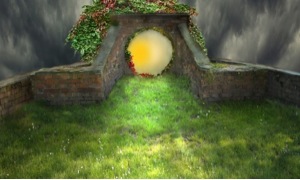 In my mind, Lewis, and others of his caliber (Tolkien, Lawhead, etc.) redeemed magic to its higher, nobler form—the creative display of God’s power through his children to further the Kingdom. A brief glance at Aslan, Gandalf, or Merlin’s power is all it takes to see how authors can elevate magic from darkly arcane, to holy and vibrant. Of course, to make ourselves feel better, we call this sort of holy power “miracles” when we discuss it in Sunday School. But in reality, the definitions for both magic and miracles include the same core element—supernatural power altering the course of normal events. And when we read Biblical accounts of God intervening in the world, we shouldn’t lose sight of how “magical” they would’ve appeared to those experiencing them—hence the examples above.
In my mind, Lewis, and others of his caliber (Tolkien, Lawhead, etc.) redeemed magic to its higher, nobler form—the creative display of God’s power through his children to further the Kingdom. A brief glance at Aslan, Gandalf, or Merlin’s power is all it takes to see how authors can elevate magic from darkly arcane, to holy and vibrant. Of course, to make ourselves feel better, we call this sort of holy power “miracles” when we discuss it in Sunday School. But in reality, the definitions for both magic and miracles include the same core element—supernatural power altering the course of normal events. And when we read Biblical accounts of God intervening in the world, we shouldn’t lose sight of how “magical” they would’ve appeared to those experiencing them—hence the examples above.
I know, I know: I embellished the details. But honestly, I didn’t change the stories that much. Isn’t it reasonable to think an angel would have telekinetic powers, that Elijah would have been viewed as a wizard by the ignorant, or that Jesus would’ve seen into the spirit world while raising Lazarus from the dead?
Okay. Great. So what?
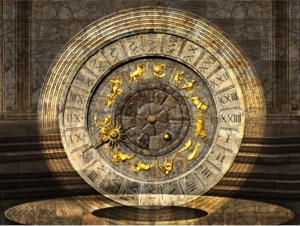 I’m glad you asked. When God moves to spread the gospel among unreached people groups, there are frequent displays of supernatural power . . . even in our modern times. Want some proof? Check out Craig Keener’s Miracles, which is one of the first encyclopedic, rigorously researched forays into the reliability of modern miracle accounts. I have both volumes and they are HUGE and chock-full of corroborating evidence. His goal was to methodically catalog for the Western church what the Body of Christ in other parts of the world already knows: God still works miracles and pretty frequently. Displays of supernatural power further the gospel. Who wouldn’t be impacted by a true, genuine healing?
I’m glad you asked. When God moves to spread the gospel among unreached people groups, there are frequent displays of supernatural power . . . even in our modern times. Want some proof? Check out Craig Keener’s Miracles, which is one of the first encyclopedic, rigorously researched forays into the reliability of modern miracle accounts. I have both volumes and they are HUGE and chock-full of corroborating evidence. His goal was to methodically catalog for the Western church what the Body of Christ in other parts of the world already knows: God still works miracles and pretty frequently. Displays of supernatural power further the gospel. Who wouldn’t be impacted by a true, genuine healing?
Therefore, if we are writing Christian fantasy, and our goal is to reflect something of God’s truth through our craft, shouldn’t we take a page out of the Holy Spirit’s playbook and portray the power of God as it actually is—amazing, miraculous, magical? I think so. If we left magical elements out of our stories, we would not represent God as he presents himself to us in the Bible. And it is, after all, THE archetypal fantasy story.
So, Christian Fantasy writers everywhere: hold your heads high when next you write of good magic. You’re in impressive company.
All images courtesy of sattva at FreeDigitalPhotos.net
– – – – –
Author Bio
 Nathan grew up in the woods of Alabama, where he spent his time exploring, hiking, and dreaming up stories. Now, as a child/adolescent therapist and author, he’s teaching kids and teens how to redeem their stories using Biblical principles. He still lives in Alabama, where you will find him with his wife and three kids every chance he gets.
Nathan grew up in the woods of Alabama, where he spent his time exploring, hiking, and dreaming up stories. Now, as a child/adolescent therapist and author, he’s teaching kids and teens how to redeem their stories using Biblical principles. He still lives in Alabama, where you will find him with his wife and three kids every chance he gets.
You can contact Nathan and follow him on his Website, Facebook, and Twitter.
____________________________________________________
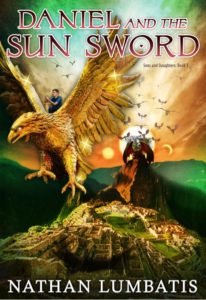 To learn more about Nathan’s fiction or to purchase a copy of Daniel And The Sun Sword, visit Amazon.
To learn more about Nathan’s fiction or to purchase a copy of Daniel And The Sun Sword, visit Amazon.
_________________________________________________________





















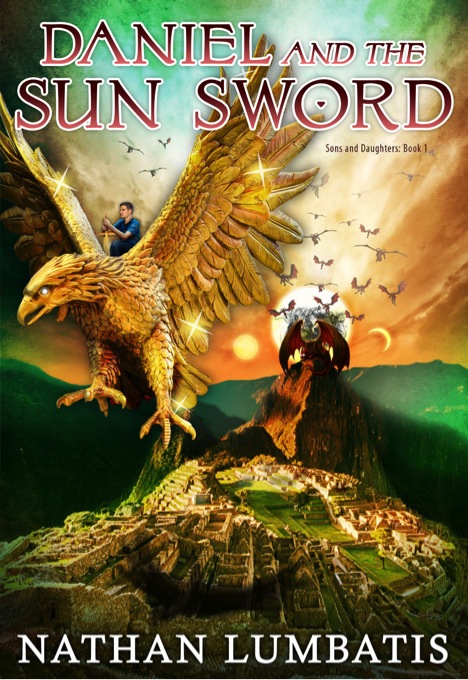







I think the assumption, or rather fear, of many people unfamiliar with the fantasy genre is that any magic in a fantasy story will be of an occult or at least occult-ish kind that readers might be tempted to try and emulate — drawing circles or pentagrams on the floor, burning candles, calling on demons or spirits or false gods for power, and so on. They see this as a “gateway drug” to real-world involvement in the occult.
But of course, there are plenty of instances of magic in fantasy stories which are completely different from any real-world occult practices and couldn’t be duplicated or emulated by a human being even if they wanted to. Some fantasy stories, like my first novel KNIFE, restrict the ability to use magic to non-human characters (in my case, faeries) who are born with magic as an inherent part of them just as you or I are born breathing. Others, like my most recent book A POCKET FULL OF MURDER, use the term “magic” to describe a practice which is basically 100% scientific, or even culinary — put together ingredients with inherently magical properties, follow the recipe, and end up with a “spell” in the form of a small biscuit or a silver charm that releases the magical power when broken. It’s no more occult, in that respect, than baking cookies or making jewelry.
I think Christian authors need to be aware that there is or can be an occult connotation to magic and that some readers may find it a stumbling block, and look for innovative ways to set their fantastical magic systems apart from anything that smacks of evil or anti-Biblical practices. [1] Tolkien did this not only by avoiding the word “magic” as much as possible but by restricting its use to non-human characters; Lewis did something similar by giving power to people like Aslan, the White Witch, and the “fallen star” Ramandu but restricting his human characters to the use of certain magical items given them with Aslan’s blessing. But there are plenty of other ways to approach magic if we take the time to think about it, as well.
[1] Unless, of course, the characters practicing the magic are themselves evil and we’re meant to understand that their use of magic is evil as well. In my second and third faery books the non-human villain is known to practice a form of dark, forbidden magic using blood, and all the heroic human and faery characters are appalled by it and determined to put a stop to it.
Exactly, R.J.
Ironically it is the (often well-meaning Christians) who fear story magic who are actually practicing a kind of “magic” themselves. They fear not just the actual occult practices God forbids in Deut. 18 (because these are meant to get direction from God and avoid harm, instead of trusting in Him to reveal Himself with a Final Prophet). Instead they fear anything they think could be like those practices. This results in a type of “white magic” practice against supposed “black magic” of books and stories.
However, Christians must not respond with accusations against this view. Instead we address this view with biblical challenges. God is bigger than the boogie-man. And the Devil is both not as frightening as we think and more frightening than we think, because his work is a lot sneakier–not so easily discerned in books with “magic.”
Eeeeeep, I love this article. Definitely including it in my “Simmer Starters” link roundup today! It’s reminded me of a children’s series or book I want to write about Jesus, presenting everything in a fantastical/heroic light that provides a new perspective on how amazing He is. 🙂 Kids are far too often taught about Jesus as a mild nice-guy, without much emphasis on his POWER and sacrifice.
Those were powerful vignettes. What a great way to remind us that we’re drawing inspiration from the greatest myth–as Tolkien described it–the story of Jesus!
Those examples were fabulous. applauds
I usually shy away from overly-miraculous things in my stories, simply because of personal preference, but I may try some experimentation now.
Trying to equate Elijah with a wizard seems like much the same problematic comparison some make in equating the Holy Spirit with the Force in Star Wars. There are a few outward similarities, but even greater differences, and those differences are very important.
The main difference is in the idea of who has control, either real or apparent. In the magical view, if the user says the right words, makes the right gestures, uses the right tools, and so on, then the user gets the desired result. The magic user is the one in control. But the point of the biblical view of God is that we are not in control, we come to Him as petitioners, but He is free to act as He sees fit, and even to act when we would rather He didn’t or not act when we desperately wish He would.
And that’s one reason trying to equate “miracles” with “magic” is questionable.
Perhaps to better understand most people’s wariness of magic in stories, some parallel examples might help. Could we imagine a Christian story set in a world in which adultery was morally ok? Or one in which child sacrifices were a holy sacrament?
There are things that cannot be salvaged. The best that can said about them is that they are perversions of the truth–adultery is a perversion of marriage, child sacrifice is a perversion of the sacrifice of Christ. Magic isn’t the same as the miraculous, it is a perversion of it.
And yet Gandalf, called a “wizard,” behaves much more like a miracle-working prophet than the stereotypical mage character who does not serve a Power higher than himself.
I think the key issue has to do with this phrase: “…magic has connotations of supernatural power derived from somewhere other than God. But does it have to?” If we follow the suggestions in this article, we’ll write magic that is clearly supernatural power derived from God. The problem is, then we’re making statements about what kind of power comes from God. If we’re not careful, this can result in problems like the you one pointed out – magic is generally presented as being under our control, yet we know that the power from God manifested in miracles is totally under His control.
This is one reason I like logical, naturalistic magic systems, for lack of a better term – powers that are presented as just another part of the world, with nothing particularly supernatural about them. They still derive from God’s power, of course – but in the same way the whole world works by His power. Magic is something to use for good or ill the same as any plants, animals, natural laws, resources… You can avoid some of the problems of making statements about the nature of God’s power, because you aren’t creating a new type of power derived from God; your magic is just another variation of the existing power manifest in God’s creation.
Anyways, I think you raise some very good points, Audie, but they are not insurmountable obstacles to writing theologically sound magic.